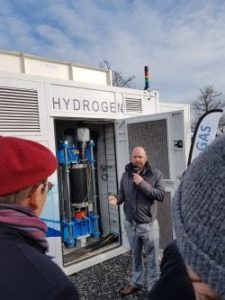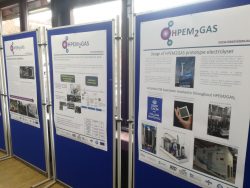What is produced from the combustion of hydrogen? Discover its effects and benefits

Hydrogen combustion is one of the cleanest and most efficient ways of obtaining energy. When hydrogen is burned, a chemical reaction takes place that releases energy in the form of heat and light, which can be used to generate electricity, power vehicles, heat buildings and much more. But what exactly is produced during hydrogen combustion? In this article, we tell you all about it.
What is hydrogen combustion?
Before going into detail about the effects and benefits of hydrogen combustion, it is important to understand what exactly this process is. Hydrogen combustion is a chemical reaction between hydrogen (H2) and oxygen (O2) that occurs when a spark is ignited or heat is applied. During this reaction, hydrogen and oxygen combine to form water (H2O), releasing energy in the form of heat and light in the process.
Effects of hydrogen combustion
Hydrogen combustion has several positive effects compared to other fossil fuels such as oil and natural gas. Firstly, it does not produce carbon dioxide (CO2) emissions, which is the main gas responsible for climate change. Instead, the only by-product of hydrogen combustion is water, which means that it is a clean and renewable energy source.
In addition, hydrogen combustion produces more energy per unit mass than other fossil fuels, making it a more efficient option. It is also safer, as hydrogen is lighter than air and disperses quickly in the event of a leak, reducing the risk of explosions.
Benefits of hydrogen combustion
Hydrogen combustion has several benefits, both for the environment and for the economy. Firstly, as mentioned, it produces no CO2 emissions, which means that it can contribute to reducing the carbon footprint of the countries and companies that use it. Moreover, as a renewable energy source, it can reduce dependence on fossil fuels and increase energy security.
It is also important to note that hydrogen combustion has great potential as a vehicle fuel. Hydrogen-powered cars produce zero emissions and have a greater range than electric cars, which could drive the transition to cleaner and more sustainable mobility in the future.
Conclusion
In summary, hydrogen combustion is a clean, efficient and safe way of obtaining energy. During this process, water is produced as the only by-product, making it a renewable and non-polluting energy source. In addition, it has several benefits for both the environment and the economy, such as reduced CO2 emissions and reduced dependence on fossil fuels.
Hydrogen combustion also has great potential to transform the transport industry, especially in the automotive sector, where hydrogen-powered cars can be a cleaner and more sustainable alternative to petrol and diesel vehicles.
In conclusion, hydrogen combustion is a promising technology that can play a key role in the transition to a more sustainable and environmentally friendly energy future.

























